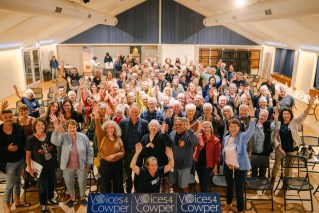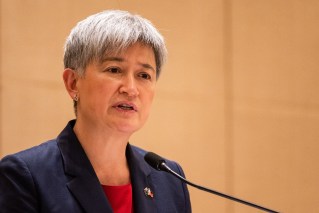Summit’s lack of focus is partly the point: Three takeaways from a talkfest

Thursday’s talkfest on the nature of employment in the Australian economy was dazzling for the diversity of its contributions.
Critics said the event would be stage managed.
But some contributions from the 143 representatives of unions, business and broader society did not stay entirely on message.
A self-described militant unionist, Liverpudlian Christy Cain, invited big business to “come to the table” and share its rising profits or be “on the menu”. Andrew Forrest, the country’s second-richest man, made a plea for cooperation in the national interest. The two men had earlier exchanged pleasantries in the foyer.
The audience was warned from the outset not to expect an easy fix for the economy.
Even easy lessons seemed hard to come by day’s end, but three points stand out.
Wages pledge lives
Employment Minister Tony Burke announced plans to change employment law including how agreements on pay and conditions can be negotiated. The goal, he said, was to lift wages.
An election pledge to get wages moving again after eight years of stagnation was dismissed as an empty promise on an issue that was beyond the influence of government.
The proposed changes to employment law include making work more flexible and compatible with parenting but also a point of serious contention: Expanding the scope of workplace deals.
At the moment, workers’ pay, if not following a legal minimum or special deal, is negotiated between an employer and their workforce (“enterprise bargaining”).
The union movement says they should be allowed to strike deals with wider effect, a process called multi-employer bargaining.
The ACTU argues employers’ hands are strengthened in any negotiation limited to one workplace at a time and employees’ bargaining power divided.
Some business groups say this could lead to individual employers becoming isolated and pressured to follow agreements because others have.
One employer body, the Ai Group, warns bargaining on this scale could even lead to “crippling” nation-wide industrial action.
The more influential Business Council of Australia did not issue a statement in response yesterday; it previously said the case for change was not convincing.
In an apparent compromise, legal protections designed to make sure no employee is made worse off by any new agreement will be made simpler, a clause businesses say is costly but which unions previously insisted on keeping.
“I’m interested in anything that gets wages moving,” Mr Burke said.
Wider bargaining, though only allowed in limited cases, has coincided with bigger pay rises.
Detail about how these proposed changes will work beyond the big picture will follow consultation.
Enough babysitting
The jobs summit has drawn comparisons to the national economic summit that followed Bob Hawke’s election in 1983.
But the government emphasised a major point of difference from the outset on Thursday.
“At the 1983 Economic Summit there were 97 participants,” Finance Minister Katy Gallagher said. “Trailblazing Senator Susan Ryan was the only woman in the room.”
In contrast, women make up the majority of this summit, which opened with a session on equal pay.
Ms Gallagher said that women and women’s economic security were at the centre of the government’s thinking on the economy.
Increasing women’s participation and closing the gender pay gap is not being framed as a moral problem. There is money and productivity at stake.
RMIT economist Leonora Risse said about 125,000 Australian women wanted to work but could not because of child care or other personal responsibilities.
Increasing the rate at which women participate to equal men’s participation rates would add some $353 billion to the Australian economy if achieved by the middle of this century, the Finance Minister said.
Helen Dalley-Fisher, from the Equality Rights Alliance, summed it up pithily: “We can’t keep asking women to babysit the economy.”
All of this happens to support one of the government’s centrepiece election promises, a controversial multibillion-dollar plan for making childcare a close to universal service subsidised even for households pulling in high six figure incomes.
Departing from script
Facilitators have directed these discussions skillfully despite some determined diversions from the floor.
One unfolded almost like a scene scripted to portray the “culture of cooperation” envisioned by the PM in a speech that morning.
ACT Senator David Pocock is an outspoken critic of the construction industry and the government’s pledge to abolish the commission that regulates it.
That body has long been viewed on the left of politics as a union-busting outfit; speaking against its abolition it might have drawn boos before a partisan crowd.
But Mr Pocock said he was concerned about workplace culture: ‘‘Fundamentally, how do we stop this issue from being the highly ideological political football it has been for more than a decade?”
He then called for a “tripartite solution” and invited Kate Jenkins, a leading expert on workplace culture, to chip in.
“I feel like this summit is another turning point,” Ms Jenkins said.
After the session Mr Burke announced the government would seize the moment and create a forum for the promotion of safety, gender inclusion and a healthy workplace culture on construction sites.
It is unlikely that debate on industrial relations would ever end with a similarly happy resolution but early discussion might blunt the usual partisan debate.
Politics then becomes a bit like the world of diplomacy and summits featuring world leaders. The details are hashed out beforehand, like in dozens of industry roundtables this month.
What happens on the day might seem peculiar but is mostly about recasting the tone of a public debate on such a divisive issue.
There will be different views over whether that matters, or is desirable. But instead of talkfests accompanied by no action, we now have action accompanied by a talkfest.







